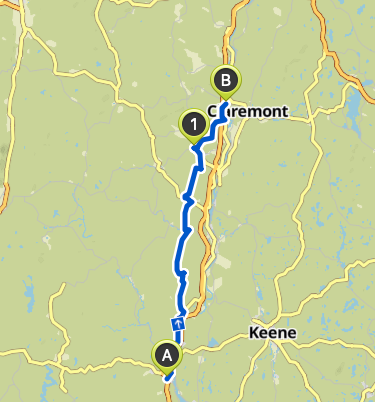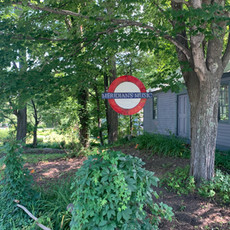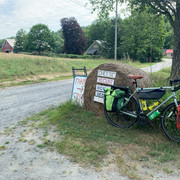Vermont Cheese Tour Day Two
- Adam Shutes
- Jul 14, 2020
- 4 min read
Updated: Jul 18, 2020

Brattleboro is a quaint town. It reminds me of Lowell, only smaller. Old brick buildings, staring down at and ganging up on, the boisterous river which hurries through town as quickly as it can.
A few cafes, a few bars, a few restaurants, they all provide a thread to the familiar city-life, even though the town is a little dot surrounded by and awful lot of green.
Grabbing a breakfast burrito to eat in the peculiarly named Pliny Park ( Pliny was never here, surely?) gave me the time to look a bit more at this Main Street town.
The rushing falls to power industry? The narrowest bridge point? I tried to make a note of checking the history of the place when I get back home. Service industry would probably be high on the list today, I imagine.
Leaving town was of course uphill, and in one of those so-called ‘Bike Lanes’ which is nothing more than a fading white line 1 metre from the curb. Come on road designers, you’ll find that white lines are no deterrent to errant vehicles.
But the road also took me along the Connecticut River - at differing distances, so that I couldn’t always see it, but the River and New Hampshire were never far until I reached Putney, when a left hook took me deeper inside Vermont. Uphill of course.
Until the end of the day, the riding would now consist of riding over the spurs of land which start inland and punched their way into the Connecticut River.
Up and down.
Up and down.
Gravel.
15% gradient.
Up and down.
The cheesemaker and town stops became very welcome indeed.
The first stop of the day was a surprise. Unplanned but so incredibly rewarding.
Livewater Farm was up a little gravel driveway in the middle of green pastures where I was happy to see cows grazing.
I went into the Farm Stand and a young man, Taylor, came in to greet me. We talked about cheese, we talked about dairying, we talked about cow breeds. I guess we geeked out a little.
The answers for you: Breeds are Normandie, Jersey, Montbeilard, and Guernsey. All wonderful milkers for cheese - Taylor knew what he was doing. Microbial rennet with one starter from Choozit, otherwise raw milk for his aged cheese. Fresh grass when possible. Then hay. Then bailage. He was still struggling with how each feed affected his cheese.
Welcome to the world of farmstead cheesemakers.
What impressed me most was his understanding about business sense, not doing too much but just trying to focus on doing a few things well: he has dropped burrata and scamorza to just keep regular mozzarella (too time consuming). He made just the one natural rind tomme-style which was aged for at least a year, and only sold at his farm. Wholesale was too much to deal with.
This was a man deep in his art, and I truly appreciated that.
No more than 5 km up the road, and up another gravel driveway, I found Vermont Shepherd. As the name suggests they are mainly sheep milk cheese makers, although I saw no sheep on the fields and the facility was set back somewhat from the shop.
You’ll probably find their cheeses on your independent cheese shop’s counter- Invierno and Verano are their two major cheeses. They are fine. Never got me very excited, but I do not doubt the work and effort which went into producing cheese which is so consistent. What did get me excited - as I walked into their self service shop was the sheep ricotta fromage frais and yoghurt.
Since I have to eat what I buy, I bought a small pot of the fromage frais and local unfiltered honey.
Zipping my way to the town I’d picked for lunch, the very disappointing Saxtons River, the fromage frais and honey was slapped onto some fresh sourdough, and combined with a fresh coffee, that lunch felt like one of kings - creamy, sweet and filling.
At this point I had covered about half of the days mileage, with another 40 km to go. These remaining kms included: a farm is marked in my notes as ‘farm on Will Dean road’, which didn’t exist; a trip to Shaw’s to pick up food for dinner where i was asked by some half-baked dude if I was a cop (seriously? Did he look at what I was wearing?); and some long stretches of uphill gravel just to make sure I would earn my dinner.
Thankfully the entrance to Wilgus State Park, - the night’s camp site - was downhill, so I cruised down (past an annotated Fern Garden, honestly!) to my spot. Task number one is always to set up the gravity water purifier, and then the unpacking and tent building begins.
This evening, the Connecticut River and I will, for the last time be neighbours - as the site sits on its banks. And although the skies for the entire day and evening have been clear, rain is forecast through the wee hours and next day.
With 120 km on the schedule for tomorrow and Springbrook Farm and Vermont Farmstead, plus a stop in Woodstock, I’m hoping that the rain will be brief and light, but the puffy clouds which are appearing over the banks of the Connecticut may have different ideas.



















Comments